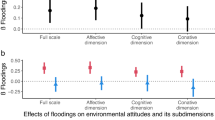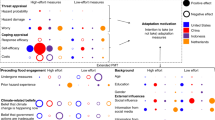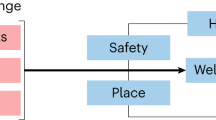Abstract
One of the reasons that people may not take action to mitigate climate change is that they lack first-hand experience of its potential consequences. From this perspective, individuals who have direct experience of phenomena that may be linked to climate change would be more likely to be concerned by the issue and thus more inclined to undertake sustainable behaviours. So far, the evidence available to test this hypothesis is limited, and in part contradictory1,2,3,4. Here we use national survey data collected from 1,822 individuals across the UK in 2010, to examine the links between direct flooding experience, perceptions of climate change and preparedness to reduce energy use. We show that those who report experience of flooding express more concern over climate change, see it as less uncertain and feel more confident that their actions will have an effect on climate change. Importantly, these perceptual differences also translate into a greater willingness to save energy to mitigate climate change. Highlighting links between local weather events and climate change is therefore likely to be a useful strategy for increasing concern and action.
This is a preview of subscription content, access via your institution
Access options
Subscribe to this journal
Receive 12 print issues and online access
$209.00 per year
only $17.42 per issue
Buy this article
- Purchase on Springer Link
- Instant access to full article PDF
Prices may be subject to local taxes which are calculated during checkout

Similar content being viewed by others
References
Whitmarsh, L. Are flood victims more concerned about climate change than other people? The role of direct experience in risk perception and behavioural response. J. Risk Res. 11, 351–374 (2008).
Dessai, S. & Sims, K. Public perception of drought and climate change in Southeast England. Environ. Hazards 9, 340–357 (2010).
Brody, S. D., Zahran, S., Vedlitz, A. & Grover, H. Examining the relationship between physical vulnerability and public perceptions of global climate change in the United States. Environ. Behav. 41, 72–95 (2008).
Zahran, S., Brody, S. D., Grover, H. & Vedlitz, A. Climate change vulnerability and policy support. Soc. Nat. Resour. 19, 771–789 (2006).
Spence, A. & Pidgeon, N. F. Psychology, climate change and sustainable behaviour. Environment 52, 9–18 (2010).
UK Energy Research Centre Making the Transition to a Secure and Low-carbon Energy System: UKERC Energy 2050 Project (UKERC, 2009).
Eurobarometer Europeans’ Attitudes Towards Climate Change (Special Eurobarometer 322, European Commission, 2009).
Leiserowitz, A., Maibach, E. & Roser-Renouf, C. Climate Change in the American Mind: Americans’ Global Warming Beliefs and Attitudes in January 2010 (Yale University and George Mason University, 2010); available at http://environment.yale.edu/uploads/AmericansGlobalWarmingBeliefs2010.pdf (accessed 28 October 2010).
YouGov/EDF Energy Survey Results (2010); available at http://www.yougov.com (accessed 28 October 2010).
Weber, E. What shapes perceptions of climate change? Wiley Interdiscip. Rev. Clim. Change 1, 332–342 (2010).
Weber, E. & Stern, P. Public understanding of climate change in the United States. Am. Psychol. 10.1037/a0023253 (in the press).
Swim, J. et al. Psychology and Global Climate Change: Addressing a Multi-Faceted Phenomenon and Set of Challenges (American Psychological Association, 2009); available at http://www.apa.org/science/climate-change.
Lorenzoni, I. & Pidgeon, N. F. Public views on climate change: European and USA perspectives. Clim. Change 77, 73–95 (2006).
Willians, L. E. & Bargh, J. A. The influence of spatial distance cues on affect and evaluation. Psychol. Sci. 19, 302–308 (2008).
Weber, E. Experience-based and description-based perceptions of long-term risk: Why global warming does not scare us (yet). Clim. Change 77, 103–120 (2006).
Tversky, A. & Kahneman, D. Availability: A heuristic for judging frequency and probability. Cognitive Psychol. 5, 207–232 (1973).
Locke, E. A. & Latham, G. P. Building a practically useful theory of goal setting and task motivation: A 35-year odyssey. Am. Psychol. 57, 705–717 (2002).
Kollmuss, A. & Agyeman, J. Mind the gap: Why do people act environmentally and what are the barriers to pro-environmental behaviour. Environ. Educ. Res. 8, 239–260 (2002).
Lawrence, A. The first cuckoo in winter: Phenology, recording, credibility and meaning in Britain. Glob. Environ. Chang. 19, 173–179 (2009).
IPCC, Climate Change 2007: Synthesis Report (eds Pachauri, R. K. & Reisinger, A.) (Cambridge Univ. Press, 2007).
Pall, P. et al. Anthropogenic greenhouse gas contribution to flood risk in England and Wales in autumn 2000. Nature 470, 382–386 (2011).
Pidgeon, N. F. & Butler, C. Risk analysis and climate change. Environ. Polit. 18, 670–688 (2009).
Hulme, M. Cosmopolitan climates: Hybridity, foresight and meaning. Theor. Cult. Soc. 27, 267–276 (2010).
Arcury, T. A. & Christinason, E. H. Environmental worldview in response to environmental problems: Kentucky 1984 and 1988 compared. Environ. Behav. 22, 387–407 (1990).
Marshall, B. K., Picou, J. S. & Bevc, C. A. Ecological disaster as contextual transformation: Environmental values in a renewable resource community. Environ. Behav. 37, 706–728 (2005).
deMan, A. & Simpson-Housley, P. Correlates of responses to two potential hazards. J. Soc. Psychol. 128, 385–391 (1988).
Pitt, M. The Pitt Review, Learning Lessons from the 2007 Floods (Cabinet Office, 2008).
Boycoff, M. We speak for the trees: Media reporting on the environment. Annu. Rev. Environ. Resour. 34, 431–457 (2009).
Preacher, K. J. & Hayes, A. F. Asymptotic and resampling strategies for assessing and comparing indirect effects in multiple mediator models. Behav. Res. Meth. 40, 879–891 (2008).
Preacher, K. J. & Hayes, A. F. SPSS Macro for Multiple Mediation (2008); available at http://www.comm.ohio-state.edu/ahayes/.
Spence, A., Venables, D., Pidgeon, N. F., Poortinga, W. & Demski, C. Public Perceptions of Climate Change and Energy Futures in Britain: Summary Findings of a Survey Conducted in January-March 2010 (Technical Report) (Understanding Risk Working Paper 10-1, Cardiff University, 2010); available at http://www.understanding-risk.org.
Acknowledgements
This research was supported by a research grant from the Economic and Social Research Council (RES-062-23-1134) as well as a Climate Change Leader Fellowship (RES-066-27-0013) and a major grant to the Understanding Risk research group from the Leverhulme Trust (F/00 407/AG). Further support was received from Horizon Digital Economy Research, RCUK grant (EP/G065802/1). The authors also wish to thank D. Venables, N. Vaughan and Ipsos MORI for assistance with the survey.
Author information
Authors and Affiliations
Contributions
All authors contributed to the design of the survey used within the work presented. A.S., N.F.P. and W.P. organized and managed the data collection. A.S. analysed the data. A.S. led in writing the paper, developing this with input from all authors.
Corresponding authors
Ethics declarations
Competing interests
The authors declare no competing financial interests.
Supplementary information
Supplementary information
Supplementary information (PDF 370 kb)
Rights and permissions
About this article
Cite this article
Spence, A., Poortinga, W., Butler, C. et al. Perceptions of climate change and willingness to save energy related to flood experience. Nature Clim Change 1, 46–49 (2011). https://doi.org/10.1038/nclimate1059
Received:
Accepted:
Published:
Issue Date:
DOI: https://doi.org/10.1038/nclimate1059
This article is cited by
-
Climate Change Denial and Corporate Environmental Responsibility
Journal of Business Ethics (2024)
-
Alarmed but Unmoved: The Impact of the Provision of Correct Local Environmental Information
Political Behavior (2024)
-
Potential for surprising heat and drought events in wheat-producing regions of USA and China
npj Climate and Atmospheric Science (2023)
-
Newspaper Coverage and Framing of Bats, and Their Impact on Readership Engagement
EcoHealth (2023)
-
Identification and prediction of climate factors based on factor analysis and a grey prediction model in China
Environmental Monitoring and Assessment (2023)



